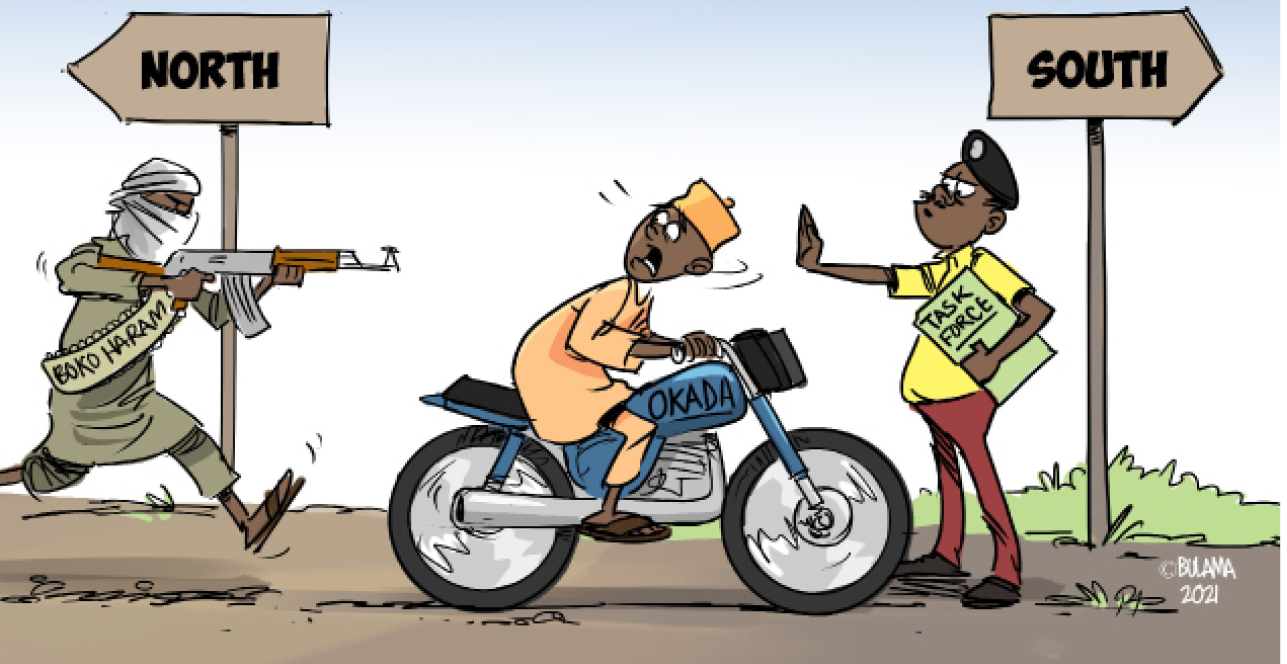Hundreds of youths have fled their home states in the North-East and North-West over the violent activities of Boko Haram insurgents and recently armed bandits in the region. While in search of greener pastures and safety, most of them have relocated to southern Nigeria where they are again being confronted with other challenges.
A good number of youths who fled the North over insecurity have found refuge in Hausa dominated communities in Lagos metropolis. Areas where they have settled include Agege, Ketu, Ijora and Alaba Rago but life has not been easy for them.
The youths said they are constantly being chased by security officials, fake task force officials and overzealous youths who see them as parasites.

We’re seen as a threat
“Since 2014, most villages in Borno have become hubs of terrorist activities,” said Abdulrahman Suleiman. “Those who resisted joining (Boko Haram) were fought and killed”, he said.
Abdulrahman resisted the temptation to join the terrorists and was forced to leave his village.
He said many young men and women managed to escape, slipping across the border to states in the South in search of menial jobs.
“Many of us fled when they raided my village – Kurmari, which is about 25 miles from Maiduguri town,” Abdulrahman, who is now operating as a commercial motorcycle rider in Ojo, Lagos State, said.
He said trying to make a living in Lagos has not been easy for them as the task force officials have impounded hundreds of their motorcycles.
“I have had about three of my motorcycles impounded by task force officials. The first was impounded at Mile 2 and the others were taken away from me at Okota. They belong to the Sarkin Alaba Rago, who gave them to us on hire purchase,” he said.
Kareem Mustapha works with contractors at the Lagos State Waste Management Authority (LAWMA). “We follow LAWMA trucks in search of used plastics, scrap iron, brass and copper, which we sell to dealers and recycling plants in the state,” he said.
He said life has not been easy because they are being hunted by officials and self-appointed task forces who take advantage of their vulnerability to exploit them.
He, therefore, appealed to northern states governors as well as the federal government to tackle insecurity in the region, saying that northern states are losing their workforce and productive population to other states in the South.
A wheelbarrow pusher at Alaba Market, Sule Ibrahim, says the recent crisis between herders and farmers in some states in the West has also affected them, noting that they are now viewed as a security threat wherever they go.
“The current rivalry between farmers and herders has also added pressure on us. We are constantly taunted as Fulani killers wherever we go. Some are hostile to us. The only way we can defend ourselves is to also put on a hostile look to ward off any attack.
“This is one of the reasons why we prefer to stay in Hausa dominated communities in Lagos. There is strength in numbers. We use our population to fight back,” he said.
A 20-year-old wheelbarrow pusher, Abdullahi from Kano State, said they hire the wheelbarrow at the cost of N500 per day to carry out their job. He, however, noted that the task force in the market constantly harasses them for ticket fees.

“The market task force here disturbs us if we don’t pay the N100 ticket fee. But once you pay, nobody disturbs you and that is why I am operating in Mirror park,” he said.
Babagana Buba Fulka was in a secondary school in 2010 when he fled his village Fulka, Gwoza Local Government Area of Borno, owing to the increasing activities of Boko Haram insurgents in the state.
He abandoned schooling and his farm to settle down in Lagos, where he was accommodated by Borno indigenes working as guards at Apapa.
“It was our parents that advised us to leave as Boko Haram were attacking schools. Some of us moved to the FCT, some to South East and other parts of the country. I found myself in Lagos, where I knew nobody then but luckily for me, I stayed with some Borno indigenes working as guards in Apapa. They helped me secure a job at a factory before I started my own business at Victoria Island, where I sell provisions,” he said.
Buba Fulka, who is now the leader of migrants from North East in the area, said they are witnessing the movement of more people from the North West, due to banditry in the region.
He said accommodation is a major challenge facing them as there is no IDP centre in the state while the government has demolished some of the settlements they were staying in.
However, he said the government paid N10m compensation when it demolished where they were staying in Ajah.
“Most of our members were operating commercial motorcycles and Keke NAPEP (tricycles) before the government restricted their movement in the area. So, they are now into petty businesses but we are still being harassed by Special Task Forces. The officers are not sincere or doing what the government asked them to do but extorting money from us,” he said.
Ibrahim Danlami Jada who is from Adamawa told Daily Trust Saturday that he has been in Lagos before the crisis in the North East, stressing that insurgency has forced many northerners to relocate to the state. He appealed to northerners to abide by the law of the state while charging task force officers to stop extorting innocent residents.
Alhaji Muhammed Sani, who hails from Sokoto, now sells fruits at the Lekki axis. Alhaji Sani said he and many others left Sokoto for Lagos due to the current security issues in the North West.
“Many people in my situation are into fruit selling. We normally do our business at the Lekki axis of Lagos and our main challenge is the way and manner the police are harassing and arresting us. Officers from Maroko Division always seize our good,” he said.
I bailed my brother and two other persons early this year. They were arrested for hawking fruits. I spent nothing less than N900, 000 to get them out,” he added.
Malam Muhammad Bawura who hails from Banki in Maiduguri town of Borno State told Daily Trust Saturday that he had to relocate from Maiduguri to Lagos due to the insurgency in the region.
“I used to trade in garlic from Maiduguri to Cameroon but when the Boko Haram insurgency started, we could no longer cross to Cameroon because the routes were no longer safe hence, I migrated to Isheri Kara in Ogun State, which is close to Lagos. I’m now into transportation business and I also buy livestock in bulk and sell,” he said.
He said northern traders are hardly harassed by security agents or thugs in Ogun State.
“Our main challenges here are not the security operatives or those collecting tax from us, the challenges are more about inflation and the way our business partners transact business with us on credit. In most cases, we don’t recover our money from them,” he added.
The Lagos State Police Command recently carried out a raid against the Awawa cult gang of Agege, whose members were alleged to be of Hausa extraction.
Hakeem Odumosu, at a press conference held in January, said scores of members of the gang were arrested during the fracas between Yoruba and Hausa traders in Agege which claimed several lives and property worth millions of naira.
No going back to the North
Twenty-eight-year-old Idris Mohammed hopes to settle down in Calabar after he fled from Zamfara, his home state, due to increasing banditry which he said has claimed many of his family members.
Three months ago, he arrived at Bogobiri, one of the two areas near Calabar where there are major settlements of Hausa/Fulanis in the state.
Idris has since joined a thriving palm oil business owned by a young man from Bauchi State.
Idris, who has two wives in Kauran Namoda near Gusau, Zamfara State, said he had a small farm in the town where he cultivated carrot and cabbage before he was forced to run.
“When I arrived, my relations encouraged me to join them in the palm oil business. I am amongst those who are sent to palm oil-producing communities in Cross River State to source for the products.
“There is peace down here. I don’t intend to return to Zamfara State. My challenge now is how to bring my two wives and children to join me in Calabar. With good friends and relatives and prevailing peaceful atmosphere, I hope to settle in Calabar,” he said.
He said he believes that he will make it in Calabar as palm oil is largely produced in the south and consumed in the north.
Edo State is also saturated with youths from the northern part of the country due to banditry and insurgency.

The youths often engage in menial jobs such as clearing and cultivating farmlands, carrying mixed concrete and blocks at construction sites, digging gutters, soakaway, toilets, wheelbarrow pushing amongst other jobs to earn a living.
The youths in their numbers often gather at Benin bypass by Ahor community and various junctions waiting for people to hire them.
They told our correspondent that they have not been harassed by any task force, but that the youths of the community they reside in sometimes become hostile towards them whenever herdsmen either allegedly attack or kill farmers.
Speaking with Daily Trust Saturday, Ibrahim Isah from Zamfara State said he was a farmer but had to leave for Edo State to engage in menial jobs due to insecurity.
Isah said he left his state due to the activities of bandits who have made farming difficult for them.
“I am a farmer, but I can no longer go to the farm because of bandits, so I had no option than to leave. Since I came here, things have been peaceful, I work on people’s farms to earn a living.”
Also speaking, Amodu Abubakar, who hails from Gwoza Local Government Area of Borno State, said he left the state due to the Boko Haram insurgency in 2015.
Amodu, who sells onion at Ikpoba hill market, said everything was going well for him until the issue of the alleged killing of farmers by herdsmen came up.
“Whenever suspected herdsmen attack farmers, some people would take it out on us, but then life goes back to being normal after everything calms down.”
The 26-year-old told Daily Trust Saturday that he makes a profit of N30, 000 monthly and doesn’t regret relocating to Edo State because he is at peace and not running from Boko Haram.
Also speaking to Daily Trust Saturday, Jamiu Muhammed, a labourer who hails from Shiroro, Niger State, and moves from site to site in search of jobs, said to avoid being killed or becoming a victim of bandits, he had to leave when the activities of bandits were getting out of hand in his area.
The 25-year-old said he came to Edo State on a truck in January this year because he could no longer go to the farm in his community.
“I am a farmer, but because of banditry, we no longer go to the farm, so when my friend told me that they were coming to Edo State to meet their brothers, I joined them.”
He said daily, they throng the Benin Bypass, waiting to be hired as labourers on construction sites, farms or for other menial jobs.
He explained that though the youth are sometimes hostile to them, it is still a better situation compared to running away from bullets and bandits.
On his part, Ismaila Jibrin, who hails from Garko in Bauchi State, said on a good day, he smiles home with between N3, 000 and N5, 000 which he makes from menial jobs like clearing of farmlands, digging of house foundations, toilet soak away pits, amongst other things to earn a living.
However, there are some days they stay idle without getting patronage.
Multiple taxations forced me out of Lagos – returnee
Musa Muhammed, an indigene of Bakori Local Government Area of Katsina State, left his village in July last year, where he used to participate in the annual seasonal farming, for Lagos due to bandits’ activities there. He said he was able to purchase a new motorcycle in the city from the money he realized after selling off his share of the farm left behind by his late father.
“I used the bike for commercial purposes at Sabo-Ikorodu area in Lagos, where I lived, but less than a month into the job, I realized that I could not make any meaningful gain due to the government’s multiple taxations. Afterwards, we were told openly that non-indigenes would no longer be allowed to operate.
“Initially, our union leaders demanded that each member should pay N3, 000, to allow us to continue operating in the area, yet after the payment, and they still insisted that strangers would not be allowed to operate in the area.”
He noted that many of the northern okada operators weren’t willing to return to their states of origin due to bandits’ activities and insecurity going on there.
“Because of banditry and insecurity in our states, we opted to remain in Lagos, despite the cat and mouse relationship with task force officials here,” he said.
He also noted that he barely makes up to N5, 000 daily, yet when arrested by any of the task force officials, they pay fines ranging from N10, 000 to N30, 000.
“As I am talking to you now, I am yet to pay back some of the money I borrowed from my associates to bail myself or my motorcycle at various times. Notwithstanding the various levies and fees, I paid at various times, I lost the motorcycle to the task force, after the facility where we used to sleep was raided at night.”
About 50 motorcycles including his were impounded during the operation.
Muhammed said he thereafter relocated to his home state of Katsina where he settled in an area that was free from the bandits’ activities, at the time. He engaged in various menial jobs that he could get, when available, but that could not sustain him, hence the decision to relocate to Abuja two months ago, where he has settled as a commercial tricycle operator.
“I got the tricycle as a loan at the rate of N1.1m from a dealer as against the market price of N660, 000,” he disclosed.
The middle-aged man, who patiently waited for his turn at a designated park temporarily allocated to the tricycle operators in Kubwa, lamented that he has to remit N15, 000 weekly to its owner. This is in addition to the N200 daily tax shared between their union and Bwari Area Council.
“If I am destined, by the grace of Almighty Allah, I would become an owner one day,” he said.
Barrister Aminu Sanusi, a human rights activist, said the plight of the youths is an indictment on the political class of northern Nigeria.
“The truth is that a whole generation of youths is about to be wasted and we will definitely pay for it.
“The earlier our political leaders in the North wake up from their slumber and address the myriad of challenges afflicting the region, the better for all us.
“All the youths trooping to the South should have been in school or gainfully employed; however, look at the situation they found themselves in in South. It is a shame that even though almost all of them are labourers, they are being chased away like aliens,” he said.
By: Eugene Agha, Abbas Dalibi (Lagos), Eyo Charles (Calabar), Adam Umar (Abuja) & Usman Bello (Edo)




